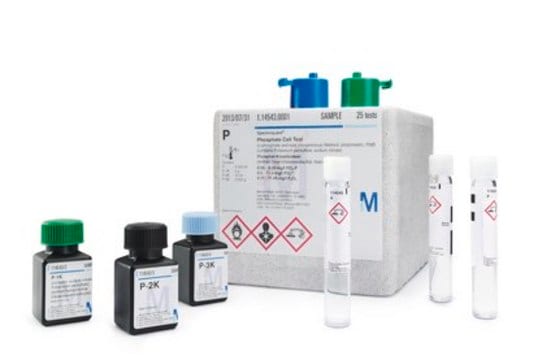1.00605
Bromine Test
photometric, 0.020-10.00 mg/L (Br2), Spectroquant®
About This Item
Recommended Products
product line
Spectroquant®
Quality Level
specific analyte(s)
bromine
measuring range
0.020-10.00 mg/L (Br2)
technique(s)
photometry: suitable
compatibility
for use with Spectroquant® Move 100
for use with Spectroquant® Nova 60 A
for use with Spectroquant® Prove 100
for use with Spectroquant® Prove 300
for use with Spectroquant® Prove 600
detection method
photometric (DPD)
storage temp.
15-25°C
General description
This Spectroquant® Bromine Reagent Test allows the accurate determination of the bromine concentration in water samples and disinfectant solutions.
Method applied: In weakly acidic solution, free bromine reacts with dipropyl-p-phenylenediamine (DPD) to form a red-violet dye which is determined photometrically.
The Spectroquant® Reagent Test Kits contain highly stable, ready-to-use reagent mixtures to perform the analysis according to the procedure described in the accompanying instruction leaflet.
All our Cell and Reagent Test Kits are equipped with the unique Live ID (2D barcode) which allows seamless method recognition and contains essential information such as lot number, expiry date, and automatic calibration updates.
Legal Information
Not finding the right product?
Try our Product Selector Tool.
Signal Word
Danger
Hazard Statements
Precautionary Statements
Hazard Classifications
Eye Irrit. 2 - Repr. 1B
Storage Class Code
6.1D - Non-combustible, acute toxic Cat.3 / toxic hazardous materials or hazardous materials causing chronic effects
WGK
WGK 2
Flash Point(F)
Not applicable
Flash Point(C)
Not applicable
Certificates of Analysis (COA)
Search for Certificates of Analysis (COA) by entering the products Lot/Batch Number. Lot and Batch Numbers can be found on a product’s label following the words ‘Lot’ or ‘Batch’.
Already Own This Product?
Find documentation for the products that you have recently purchased in the Document Library.
Customers Also Viewed
Our team of scientists has experience in all areas of research including Life Science, Material Science, Chemical Synthesis, Chromatography, Analytical and many others.
Contact Technical Service


